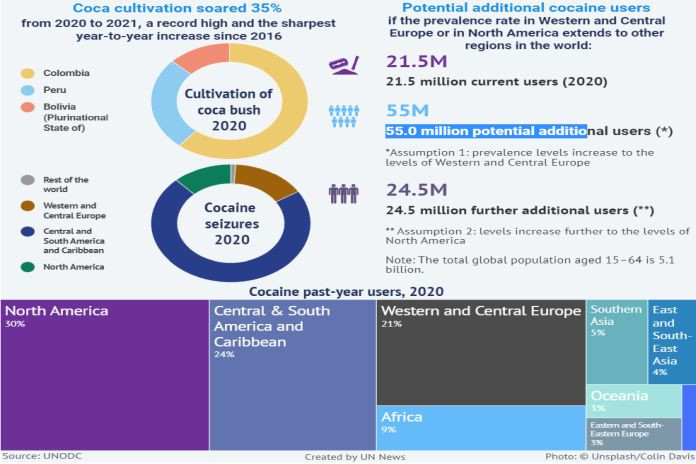NEW YORK, USA – Routed through new hubs and expanded criminal networks, cocaine trafficking has made a dramatic comeback following an initial slowdown caused by the emergence of COVID-19, the UN Office on Drugs and Crime said on Thursday in a hard-hitting new report.
“The surge in the global cocaine supply should put all of us on high alert,” UNODC executive director Ghada Waly said. “The potential for the cocaine market to expand in Africa and Asia is a dangerous reality.”
Sky high supply and demand
Criminal networks are now diversifying with alarming results alongside record levels of production, moving beyond the pandemic and its related global shutdown, which had appeared to have temporarily hobbled the illicit trade, UNODC said in its Global Report on Cocaine 2023.
To best respond, Waly urged governments and others to closely examine the report’s findings to determine how this transnational threat can be met with transnational responses based on awareness raising, prevention, and international and regional cooperation.
Inroads into Africa and Asia
The report details how coca cultivation soared 35 per cent from 2020 to 2021, a record high and the sharpest year-to-year increase since 2016.
The rise is a result of both an expansion in coca bush cultivation and improvements in the process of converting coca bush to cocaine hydrochloride, the drug which is then sold on the streets.
The supply surge matches a steep growth in demand, with many regions showing a steady rise in cocaine users over the past decade. While the cocaine market remains quite concentrated in the Americas and parts of Europe, the report warns that there is a strong potential for a large expansion in Africa and Asia.
The report examines the emergence of new hubs for cocaine trafficking, noting that countries in Southeastern Europe and Africa – particularly those in West and Central Africa – are increasingly being used as key transit zones for the drug.
Ports on the North Sea like Antwerp, Rotterdam, and Hamburg, meanwhile, have eclipsed traditional entry points in Spain and Portugal, for cocaine arriving in Western Europe. Traffickers are also diversifying their routes in Central America by sending more and more cocaine to Europe, in addition to North America.

Record-high seizures
Arrests and seizures have also skyrocketed. Interceptions of cocaine shipments by law enforcement around the world recorded seizures reaching a record high of nearly 2,000 tons in 2021.
The report shows a criminal landscape fragmented into myriad trafficking networks. Examining these groups’ modalities, the report found new traffickers filling gaps and an array of so-called “service providers” lending supply-chain services “for a fee”.
For instance, the demobilization of fighters from the Revolutionary Armed Forces of Colombia (FARC), which had previously controlled many of Colombia’s coca-growing regions, created an opening for others to step in. This includes new, local actors, ex-FARC fighters, and foreign groups from Mexico and Europe, the report showed.
Tracking trends
Angela Me, chief of the UNODC Research and Analysis Branch, said the report contains a wealth of more information about the phenomenon.
“With its latest knowledge and trends on the routes, modalities, and networks employed by criminal actors,” she said, “it is my hope that the report will support evidence-based strategies which stay ahead of future developments in cocaine production, trafficking, and use.”
Me told UN News in an interview before the report launch that dealing with the increase in demand for cocaine was a major international challenge, so rethinking ways in which countries could work together to tackle the problem was much needed.
“The evidence shows that the cocaine problem is a transnational trans-Atlantic transcontinental problem,” she told us.






